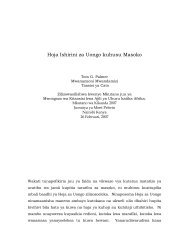Preventing Electoral Fraud report SAIRR May 11 ... - AfricanLiberty.org
Preventing Electoral Fraud report SAIRR May 11 ... - AfricanLiberty.org
Preventing Electoral Fraud report SAIRR May 11 ... - AfricanLiberty.org
Create successful ePaper yourself
Turn your PDF publications into a flip-book with our unique Google optimized e-Paper software.
General by an individual who was in fact acting for the MDC. However, the<br />
Registrar-General quickly realised what had happened. Hence, when additional<br />
copies were requested, all further sales of such material were blocked by him.<br />
April 2002 A High Court application by the MDC to have the roll, as used in<br />
the 2002 presidential election, released in digital format was rejected. 7<br />
<br />
<br />
<br />
<br />
<br />
The MDC's application to acquire the presidential voters' roll then went to the<br />
Supreme Court, and was ultimately denied in a poorly reasoned judgment. Mr<br />
Justice J Friedman, acting as an Independent Observer on behalf of the Forum for<br />
Barristers and Advocates of the International Bar Association, found “the<br />
judgment of the Supreme Court...fundamentally flawed”, adding: “The outcome<br />
of the appeal can therefore....only be described as highly unsatisfactory.” 8<br />
February 2005 An application by the MDC for the voters' roll in digital format<br />
for the imminent 2005 general election was denied.<br />
These successive efforts created considerable bad publicity and embarrassment<br />
for the Zanu-PF regime. Hence, in early 2008 the law was changed to allow a<br />
voters' roll to be supplied in digital format to political parties and interested NGOs<br />
prior to an election. This proved of great significance when Zimbabwe in 2008<br />
staged “harmonised” elections in which voters cast their votes at the same time for<br />
Parliament, the President, the Senate, and their local municipal council.<br />
March 2008 The voters' roll was supplied to political parties, though not in the<br />
readable digital format specified. In addition, the roll for some constituencies was<br />
delivered only after the election was over. The experience of the Zimbabwe<br />
<strong>Electoral</strong> Support Network (ZESN) was typical, for instead of being supplied with<br />
computer disks with the data in analysable form, the ZESN received – only well<br />
after the elections had taken place – a set of 210 CDs of the roll in “tiff” (tagged<br />
image file format). This meant that the CDs contained a photographic<br />
reproduction of each page of the roll, a format not easily susceptible to analysis.<br />
It must have been a large and deliberate exercise to photograph every page of the<br />
roll in that way. It would certainly have been far easier for the Registrar-General<br />
to supply the information in the digital form which his office already used. There<br />
seems little doubt that the law was thus flouted, precisely with the objective of<br />
preventing timeous analysis of the voters' roll.<br />
2009 An MDC application to obtain a copy of the voters' roll as used in the<br />
2008 harmonised elections was denied by the ZEC.<br />
7<br />
Zimbabwe Law Reports 2002, M<strong>org</strong>an Tsvangirai v Registrar-General and Others, High Court,<br />
Harare, HC 12092/01<br />
8<br />
The Hon Justice Mr. J Friedman, Report as Independent Observer, 15 January 2003<br />
15



